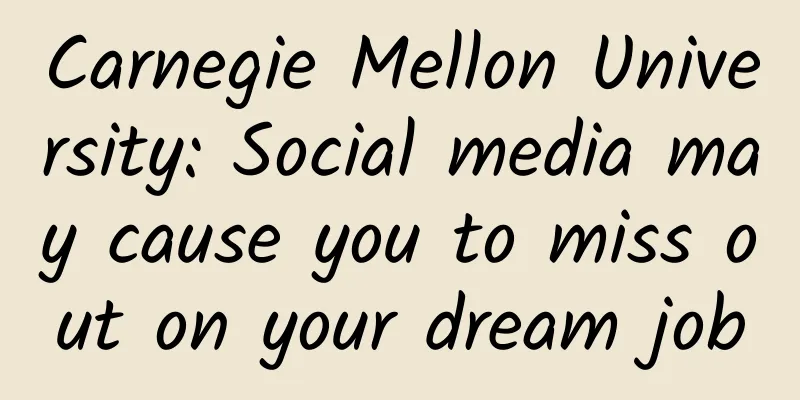Carnegie Mellon University: Social media may cause you to miss out on your dream job

In 1874, Patrick Francis Healy became the first African-American president of Georgetown University in the United States, and the first African-American president of a white university. His career was not affected by racial discrimination because most people at the time thought he was white. Neither reporters, the board of directors, nor Georgetown University professors or students could discover his African-American background. With the development of the Internet, this level of privacy may no longer be possible . People can easily check other people's background information or confirm the authenticity of their academic qualifications; for employers, it is also easy to find out the religion, race and personal opinions of job seekers. Although recruitment discrimination is illegal, we all know that discrimination is always unavoidable. With online searches, employers' discrimination against candidates has become more difficult to detect. Alessandro Acquisti and Christina M. Fong of Carnegie Mellon University recently conducted a study to explore the use of social media in talent recruitment. First, they set up Facebook accounts for fictitious job applicants, with almost the same information except for religion (Christian or Muslim) and sexual orientation (straight or homosexual). Then they sent the applications of these fictitious candidates to more than 4,000 companies, without including religious and sexual orientation information. If employers want to know this information, the only way is to check their Facebook accounts. The results of the experiment showed that about 33% of employers checked the Facebook accounts of job applicants. The researchers found that employers did not seem to show obvious discrimination against gay job applicants, but they did tend to choose Christian job applicants and reject Muslim job applicants. Only about 2% of Muslim job applicants received interview invitations, while 17% of Christian job applicants received interview opportunities. The 33% result of the Carnegie Mellon University study is roughly in line with other studies. A 2014 study surveyed 2,000 employers and found that about 40% of employers would look up applicants' information on the Internet, and after looking up applicants' information online, about half of the employers would choose to reject the applicant's application. Among employers who have not yet adopted this strategy, 12% said they would make similar attempts in the future. Therefore, the current trend is that more and more employers tend to look up applicants' information online, and most of the results of the search are often unfavorable to the applicant. Martin Gaskell once applied for a teaching position at the University of Kentucky in the United States, and was ranked high among many candidates at the time. However, after searching online, the school found that Martin was an evangelical Christian and had doubts about Darwin's theory of evolution. Therefore, the school decided to reject his application. Martin then sued the University of Kentucky, claiming that the school had religious discrimination. In the end, the two parties reached a settlement, and the University of Kentucky paid Martin $125,000 in compensation. Without the Internet, anyone who wanted to know Gaskell's religious beliefs would have to ask him directly. This would make the employer's intentions very obvious and give people a basis for appeal. During the interview, Gaskell could also refuse to answer such questions. However, the Internet eliminates these processes and applicants can no longer control the extent of employers' knowledge of their information. To reduce the possibility of discrimination in hiring due to social media, here are four practical suggestions: 1. Social media companies should pay attention to protecting users' personal information and minimize the potential harm that this information may cause to users. For example, Facebook invites users to fill in their religious information - is this really necessary? In addition, Facebook will also directly disclose users' names/accounts, gender, age, social networks, profile pictures, covers and other information online. Rich personal information can indeed facilitate users' friends or family to search, but it also gives potential employers the opportunity to snoop into applicants' privacy. 2. Companies should have clear policies limiting online background searches to only those related to the job. If possible, applicants’ applications should be anonymous, with numbers instead of names, so employers can’t decide who stays and who leaves by looking at social media accounts. 3. Government agencies should do more to scrutinize whether companies engage in prohibited discrimination in hiring. Perhaps they can also adopt a similar approach to the Carnegie Mellon University study, sending out fictitious resumes to collect data. 4. Most importantly, as users, we need to be more cautious when posting information online. We need to consider that every piece of information we post now may be presented to future employers. After all, we now live in a highly digital and globalized world. This article is exclusively translated and published by Sohu International with permission from the Los Angeles Times Original URL: //www.latimes.com/opinion/op-ed/la-oe-0107-strauss-employment-discrimination-online-20160107-story.html |
>>: Sutu Research Institute: Analysis of Android App Store Market in the First Half of 2013
Recommend
Treatment for constipation and bad breath in women
Bad breath refers to a disease in which the insid...
What are the symptoms and treatment methods of female yang deficiency?
It is relatively rare for female friends to suffe...
Precautions for threatened abortion
There are many things to pay attention to when ha...
How to delay menopause?
As people age, some organs in their bodies will s...
Persimmons are in season, how can we share their deliciousness and safety?
At present, sweet and tempting persimmons have be...
Can I drink rose water during menstruation?
The menstrual period is a special period for any ...
Is it accurate to test whether you are not pregnant after 16 days of intercourse?
Women are very likely to become pregnant if they ...
7 unknown facts about breasts forming a figure 8 when running
Core Tip: Many people are obsessed with women'...
What exactly does women’s vaginal discharge mean?
Some of you may be unfamiliar with vaginal discha...
Why does my lower back hurt so much after my second caesarean section?
In recent years, many families have started to ha...
What tests are needed for cervical cancer screening?
There are generally many reasons for the onset of...
The dangers of intestinal gas in women
Not many people have heard of hernia, and even fe...
Can pregnant women eat sweet peas?
A pregnant woman is carrying a new life. As an ex...
The dangers of high-risk human papillomavirus infection
Many people do not have enough knowledge about hi...
Why is there black blood during menstruation?
All physical reactions of women during their mens...









